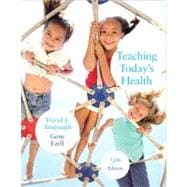
Note: Supplemental materials are not guaranteed with Rental or Used book purchases.
Purchase Benefits
What is included with this book?
David J. Anspaugh is a Professor Emeritus at the University of Memphis. He has extensive experience serving for various organizations, such as American Alliance for Health, Physical Education, Recreation and Dance (AAHPERD) and various regional branches of the organization. Recently, Anspaugh has served as president of the Indiana Association for Health, Physical Education, Recreation and Dance (IAHPERD). He is currently the President-Elect of Midwest District AAHPERD. In 2007 he was selected by the American Association for Health Education as the University Health Educator of the year. He has published several dozen books and journal articles and has won five distinguished teaching awards.
Gene Ezell is a Professor of Health Education at the University of Tennessee in Chattanooga, Tennessee. He also serves as the Departmental Health Education Curriculum Coordinator and is responsible for evaluating revisions to the undergraduate and graduate health education course offerings. He is an active member of AAHPERD and the Tennessee AHPERD. He has written, cowritten, and reviewed several books and journal articles in the field of health education. Ezell is the recipient of several awards, including the United States’ College Health Educator of the Year award (1995).
| The Need for Health Education | |
| The Role of the Teacher in Coordinated School Health Programs | |
| Planning for Health Instruction | |
| Strategies for Implementing Health Instruction | |
| Measurement and Evaluation of Health Education | |
| Mental Health and Stress Reduction | |
| Strategies for Teaching Mental Health and Stress Reduction | |
| Body Systems | |
| Personal Health | |
| Strategies for Teaching Body Systems and Personal Health | |
| Sexuality Education | |
| Strategies for Teaching Sexuality Education | |
| Substance Use and Abuse | |
| Strategies for Teaching About Substance Use and Abuse | |
| Infectious and Noninfectious Conditions | |
| Strategies for Teaching About Infectious and Noninfectious Conditions | |
| Nutrition | |
| Strategies for Teaching Nutrition | |
| Injuries: Accident and Violence Prevention | |
| Strategies for Teaching About Injuries: Accident and Violence Prevention | |
| Consumer Health | |
| Strategies for Teaching Consumer Health | |
| Aging, Dying, and Death | |
| Strategies for Teaching About Aging, Dying, and Death | |
| Environmental Health | |
| Strategies for Teaching Environmental Health | |
| Table of Contents provided by Publisher. All Rights Reserved. |
The New copy of this book will include any supplemental materials advertised. Please check the title of the book to determine if it should include any access cards, study guides, lab manuals, CDs, etc.
The Used, Rental and eBook copies of this book are not guaranteed to include any supplemental materials. Typically, only the book itself is included. This is true even if the title states it includes any access cards, study guides, lab manuals, CDs, etc.